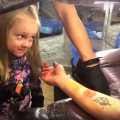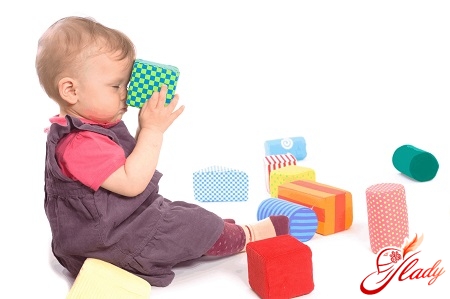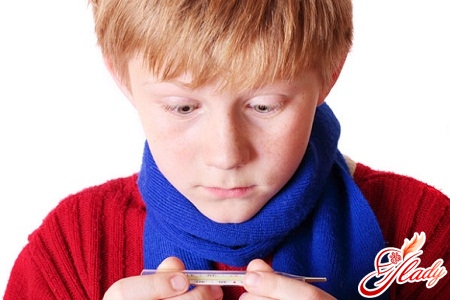 A photo: firestock School performance is what parents usually put first. And it seems surprising to them why the neighbor troechnik Kolya rides a luxury jeep, and the diligent student and pride of the school Masha works as an ordinary employee in an obscure company. Self-assessment is extremely important for every person. Psychologists say that people around us treat us the way we treat ourselves. This explains the fact that people with low self-esteem, even having outstanding qualities, cause to themselves only hostility and disrespect. But mediocre, but loving and valuing people often achieve great heights, and all because they inspire others with respect and reverence. Self-esteem is formed throughout the entire period of maturation. It is important that parents give proper attention to this. How to correct the child’s self-esteem, we were told by the medical psychologist Elena Nikolaeva. Elena Nikolaeva, medical psychologist
A photo: firestock School performance is what parents usually put first. And it seems surprising to them why the neighbor troechnik Kolya rides a luxury jeep, and the diligent student and pride of the school Masha works as an ordinary employee in an obscure company. Self-assessment is extremely important for every person. Psychologists say that people around us treat us the way we treat ourselves. This explains the fact that people with low self-esteem, even having outstanding qualities, cause to themselves only hostility and disrespect. But mediocre, but loving and valuing people often achieve great heights, and all because they inspire others with respect and reverence. Self-esteem is formed throughout the entire period of maturation. It is important that parents give proper attention to this. How to correct the child’s self-esteem, we were told by the medical psychologist Elena Nikolaeva. Elena Nikolaeva, medical psychologist Each of us would like to see your child.successful, confident, worthy, but not all parents understand what role his self-esteem plays in this. Self-esteem, or, otherwise, self-attitude, the child’s perception of himself is formed at an early age under the influence of many factors. This is the opinion of others, and the general psychological atmosphere, and the relationship between parents, parents and children, different generations, and of course the attitude of parents to the child. The increase in self-esteem of the child, his self-confidence is the result of the daily work of parents and close environment. for parents, to sincerely love your child and show him all your love, to be attentive to him, then you will see where he is having difficulties, what problems he has, what is connected with experiences. Once you have found the weak points, look for a way to strengthen them.
Each of us would like to see your child.successful, confident, worthy, but not all parents understand what role his self-esteem plays in this. Self-esteem, or, otherwise, self-attitude, the child’s perception of himself is formed at an early age under the influence of many factors. This is the opinion of others, and the general psychological atmosphere, and the relationship between parents, parents and children, different generations, and of course the attitude of parents to the child. The increase in self-esteem of the child, his self-confidence is the result of the daily work of parents and close environment. for parents, to sincerely love your child and show him all your love, to be attentive to him, then you will see where he is having difficulties, what problems he has, what is connected with experiences. Once you have found the weak points, look for a way to strengthen them. Photo: firestock Elena Nikolaeva, medical psychologist
Photo: firestock Elena Nikolaeva, medical psychologist To form adequate self-esteem for parentsIt is important to create such a relationship with the child in which he will be able to perceive himself favorably, feel the love and support of his parents in a variety of situations. In this case, without lowering his self-esteem, he will be able to perceive small comments addressed to him, criticism, losses, failures and other people's successes. Do not forget that the child carefully observes and often copies the behavior of his parents. Show by your own example an adequate attitude to successes and failures. Self-esteem is not inherited, but acquired. If possible, try to form initiative even in the most shy child, so that he learns to do something independently. A good way to develop self-confidence in children is to assign them feasible household chores. A two-year-old can pick up his toys from the floor and put them in a special container, a three-year-old can take the laundry to the basket for washing, and children aged 5-6 can wash their cups and plates, water the flowers, wipe the dust in accessible places. A sense of responsibility, even on a small scale, is great for organizing, fostering independence and giving an understanding that everything will work out. If a child feels that he can cope with difficulties and complete feasible tasks, this will really increase his self-esteem.
To form adequate self-esteem for parentsIt is important to create such a relationship with the child in which he will be able to perceive himself favorably, feel the love and support of his parents in a variety of situations. In this case, without lowering his self-esteem, he will be able to perceive small comments addressed to him, criticism, losses, failures and other people's successes. Do not forget that the child carefully observes and often copies the behavior of his parents. Show by your own example an adequate attitude to successes and failures. Self-esteem is not inherited, but acquired. If possible, try to form initiative even in the most shy child, so that he learns to do something independently. A good way to develop self-confidence in children is to assign them feasible household chores. A two-year-old can pick up his toys from the floor and put them in a special container, a three-year-old can take the laundry to the basket for washing, and children aged 5-6 can wash their cups and plates, water the flowers, wipe the dust in accessible places. A sense of responsibility, even on a small scale, is great for organizing, fostering independence and giving an understanding that everything will work out. If a child feels that he can cope with difficulties and complete feasible tasks, this will really increase his self-esteem.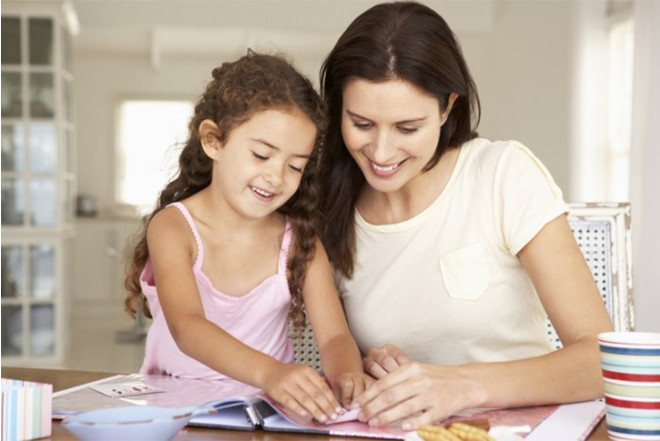 Photo: firestock Elena Nikolaeva, medical psychologist
Photo: firestock Elena Nikolaeva, medical psychologist Teach your child to finish what he started.Make it a rule to come to the rescue only when the child asks for it. As he grows, do not forget to tell him that he is big enough and that he can handle this task, he can handle it himself. Learn to switch attention from what did not work out to what worked out well (“Yes, today you lost the sea battle, but you hid your ships very cleverly, even I would not have thought of that”). Develop the child’s sociability, help him make new acquaintances, but control his social circle (at least until he is 9-10 years old). A child’s self-esteem is formed under the influence of people who are important to him. If a 3-year-old’s self-image is formed mainly by his parents and under the influence of adults, then a 7-year-old child can already fall under the influence of his peers. Control the appearance of such a “friend” among them who will suppress your child’s self-esteem and allow offensive remarks towards him. Do not forget to praise your child. Find in your child and his behavior what you can praise him for sincerely, what causes your admiration and pride. Having heard pleasant words addressed to him, he will try even harder to get approval again. Let your children grow up happy and self-confident, surrounding them with love, respect and support. To determine the level of self-esteem, psychologists use various tests. We offer you the evaluative projective method "Tree" by D. Lampen. According to the instructions, it is necessary to invite the child to look at a picture with a tree and little people and start coloring it. Moreover, at first the child should color the trunk and branches of the tree brown (as he colors, he examines and studies the picture in detail, noticing what each of the little people is doing and what mood he is in). Then it is suggested to color in red the little person who, in the child's opinion, is most similar to him (mood, position); and in green - the little person he would like to be in the future.
Teach your child to finish what he started.Make it a rule to come to the rescue only when the child asks for it. As he grows, do not forget to tell him that he is big enough and that he can handle this task, he can handle it himself. Learn to switch attention from what did not work out to what worked out well (“Yes, today you lost the sea battle, but you hid your ships very cleverly, even I would not have thought of that”). Develop the child’s sociability, help him make new acquaintances, but control his social circle (at least until he is 9-10 years old). A child’s self-esteem is formed under the influence of people who are important to him. If a 3-year-old’s self-image is formed mainly by his parents and under the influence of adults, then a 7-year-old child can already fall under the influence of his peers. Control the appearance of such a “friend” among them who will suppress your child’s self-esteem and allow offensive remarks towards him. Do not forget to praise your child. Find in your child and his behavior what you can praise him for sincerely, what causes your admiration and pride. Having heard pleasant words addressed to him, he will try even harder to get approval again. Let your children grow up happy and self-confident, surrounding them with love, respect and support. To determine the level of self-esteem, psychologists use various tests. We offer you the evaluative projective method "Tree" by D. Lampen. According to the instructions, it is necessary to invite the child to look at a picture with a tree and little people and start coloring it. Moreover, at first the child should color the trunk and branches of the tree brown (as he colors, he examines and studies the picture in detail, noticing what each of the little people is doing and what mood he is in). Then it is suggested to color in red the little person who, in the child's opinion, is most similar to him (mood, position); and in green - the little person he would like to be in the future.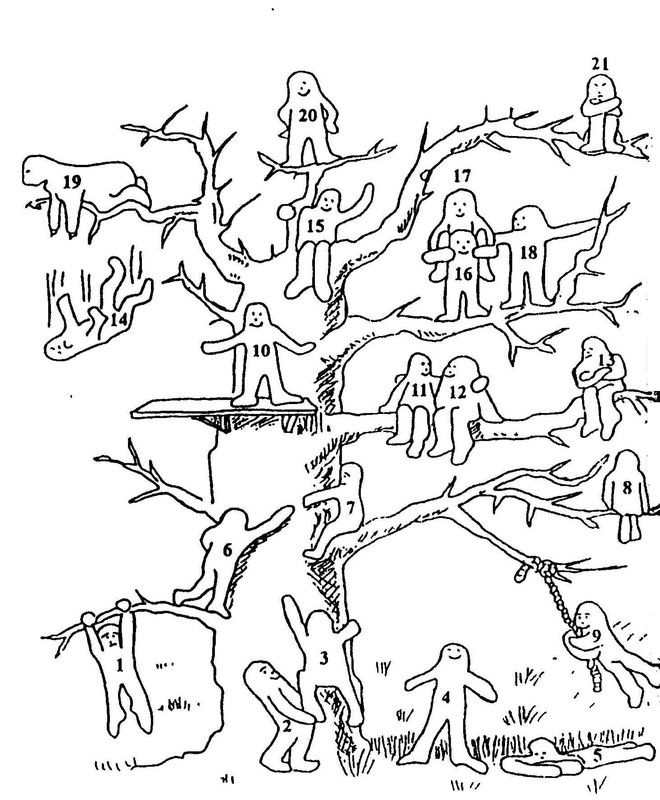 Photo: evaluative projective method "Tree" by D.LampenaLittle men #1, 3, 6, 7 are chosen by children who easily overcome obstacles and who are not afraid of difficulties that arise in communicating with peers or adults. #2, 11, 12, 18 and 19 represent sociability and the ability to make friends. #20 is associated with a child with high self-esteem, a leader by nature and self-confident. #4 is chosen, as a rule, by the child who is in absolute harmony with himself and does not want to move forward, achieving new goals. #5 characterizes physical weakness, rapid fatigue, shyness. #8 - detachment and withdrawal into one's thoughts. #9 - lightness and craving for entertainment. Little men #13 and 21 are chosen by withdrawn and anxious children, and #10 and 15 - kids who feel good and comfortable in a group of children. Children who are experiencing a crisis or strong internal fear at this moment associate themselves with No. 14. No. 16 represents a child who adapts to any opinion and is ready to make sacrifices. No. 17 characterizes a child who is unable to cope with emerging problems on his own. Thus, children with the most adequate self-esteem and harmonious internal state choose little people with numbers: 1, 2, 3, 6, 7, 10, 11, 12, 15, 18, 19. But parents of children who chose No. 14, 8, 13, 16, 17, 21 should be especially attentive to their children.
Photo: evaluative projective method "Tree" by D.LampenaLittle men #1, 3, 6, 7 are chosen by children who easily overcome obstacles and who are not afraid of difficulties that arise in communicating with peers or adults. #2, 11, 12, 18 and 19 represent sociability and the ability to make friends. #20 is associated with a child with high self-esteem, a leader by nature and self-confident. #4 is chosen, as a rule, by the child who is in absolute harmony with himself and does not want to move forward, achieving new goals. #5 characterizes physical weakness, rapid fatigue, shyness. #8 - detachment and withdrawal into one's thoughts. #9 - lightness and craving for entertainment. Little men #13 and 21 are chosen by withdrawn and anxious children, and #10 and 15 - kids who feel good and comfortable in a group of children. Children who are experiencing a crisis or strong internal fear at this moment associate themselves with No. 14. No. 16 represents a child who adapts to any opinion and is ready to make sacrifices. No. 17 characterizes a child who is unable to cope with emerging problems on his own. Thus, children with the most adequate self-esteem and harmonious internal state choose little people with numbers: 1, 2, 3, 6, 7, 10, 11, 12, 15, 18, 19. But parents of children who chose No. 14, 8, 13, 16, 17, 21 should be especially attentive to their children.

Making Money with Desserts: Success Stories
Evgeniya Polischuk (Fedutinova) instagram:@evgeniyafedutinovavk.com/janeshomebaking– It all started with baking for family and friends. Gradually, I started posting photos of my baked goods on Instagram – and orders started coming in. I made my first custom-made cake on October 13, 2014, and a little earlier I started making macaroons and cupcakes. You could say that the business “found me”, I am very […]

Soups are cold recipes with photos
Cold cucumber soup with yogurt and lemonsorbet from the chef of the restaurant La Taverna Alexander Zhurkin Photo: Getty Images Ingredients: Plain yoghurt – 125 g Cucumber – 150 g Lemon/lime sorbet – 50 g Cocktail shrimp – 24 g Fresh ginger juice – 1 g Lime juice – 5 g Fresh orange juice – 5 g Parsley – 1 g Pink pepper – 1 g Watercress – […]

barbeque kebab
Pork tenderloin in glaze Photo:Dmitry Bayrak/dbstudioPreparation time: 20 minutes + marinating time.Calories: 454 kcal per serving.For 4 servings: 4 pork tenderloins (approximately 300 g each), 1 onion, 2 cloves of garlic, 1 tsp. lemon zest, 1 tsp. lemon juice, a pinch of ground cumin, coriander and turmeric, 1 tbsp. vegetable […]

Pierre Duacan: dietary recipes: Ducane diet
Beetroot soup Photo:Season’S, Luxury Hotels RepresentationYou will need:· Boiled beetroot – 60 g· Fresh cucumbers – 20 g· Red radish – 20 g· Green onions – 10 g· Egg – 1 pc.· Drinking mineral water – 200 g· Salt – 1 gPreparation:· Boil the egg and beetroot.· Grate the cucumbers, radish and part of the beetroot. Put everything […]
How to increase a child's self-esteem?
 Have you noticed that some children havesimply an amazing ability to communicate with everyone around them - peers, teenagers, adults? Such children are happy and cheerful, they are always in a good mood and attract the attention of everyone around them without exception. And some are sullen loners, with whom there is nothing to talk about. This is a sad sight. But this means only one thing - such a sullen person has low self-esteem and the parents are exclusively to blame for this. After all, the family is the basis of the future character and disposition of the child. It is mom and dad who form the baby's internal assessment of his behavior, skills and even intelligence.
Have you noticed that some children havesimply an amazing ability to communicate with everyone around them - peers, teenagers, adults? Such children are happy and cheerful, they are always in a good mood and attract the attention of everyone around them without exception. And some are sullen loners, with whom there is nothing to talk about. This is a sad sight. But this means only one thing - such a sullen person has low self-esteem and the parents are exclusively to blame for this. After all, the family is the basis of the future character and disposition of the child. It is mom and dad who form the baby's internal assessment of his behavior, skills and even intelligence.
How to recognize that a child has low self-esteem?
The likelihood that a child's self-esteem will be lowoccurs regardless of the influence of parents, is great. That is, mom and dad, without noticing it, artificially lead the baby to the decision: "I'm not like everyone else." To identify this problem, psychologists advise, first of all, to talk to the baby. First, listen to what the child says about himself. If his set of phrases for characterization includes "lazy", "greedy", "clumsy", "ugly", "stupid", then it's time to sound the alarm. Such children believe that they simply do not have the right to make a mistake - otherwise, they will be dissatisfied with them. If the baby constantly asks about the correctness of his actions (even banal washing), then ask - why is he doing this? Surely, the baby will frown and answer: "I don't know." Each movement of the child is uncertain. Just pay attention to how the baby responds to your request, for example, to wash his boots. He will do it slowly and very strangely: his hands are shaking, there are many fussy movements. This is also a sign of a child's low self-esteem - in this way, the child tries not to make a mistake in fulfilling the request. Very often, this state goes too far, and then a child with low self-esteem grows up to be an insecure loser. Such people:
- They are always the object of ridicule, smirk and mockery;
- Usually alone - no friends, no girlfriends, no just good friends;
- Do not make their own independent decisions and are ready to follow any person;
- With the accumulation of failures, a person can completely sneak and "hit all the hard" - alcoholism, drug addiction, theft.
Fear, loneliness and continuous failures areconstant companions of people with low self-esteem. It is unlikely that any parent dreams of seeing their child like this. It is necessary to take measures immediately, as soon as the first signs of such problems are noticed. And under no circumstances reproach the child for anything - your reproaches certainly do not increase self-esteem.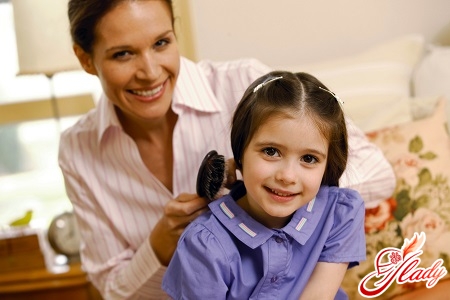
What to do?
First of all, treat your child asк личности, сформировавшемуся человеку. Если вы что-то там себе придумываете, то это не значит, что ваш малыш думает так же, как и вы. Яркий пример: Ребенок говорит: «Я пойду гулять». Что он подразумевает под этим, о чем думает? Да все просто: «Я устал и хочу просто проветрить мозги, немного побегать с друзьями и пообщаться вот с той девочкой из соседнего подъезда». А что думает мать – он лентяй, не хочет мне помогать и думает только о гульках! Отсюда идут запреты, слезы, обиды и скандалы. Взаимопонимание ухудшается, и ребенок сразу ощущает себя каким-то рабом, которого просто не выпускают погулять. Разговаривать со своим чадом надо только «на равных», иначе он так и не станет самостоятельной личностью. Сами убедитесь в этом – попробуйте вести себя как с взрослым родственником. Сразу же увидите ответную реакцию – ребенок начнет осознавать свою значимость, он будет более откровенным и перестанет воспринимать советы родителей, как излишнюю опеку. Постарайтесь хвалить его за все. Даже если что-то получилось неправильно, ваш малыш заслуживает похвалы только за то, что отважился сделать полезное дело. Обязательно мягко и аккуратно покажите ребенку, как сделать все правильно – только именно ненавязчиво и не с претензиями. «Добро всегда побеждает зло» — это не сказка, а реальность. Ищите подход к своему ребенку. Все дети разные – они ведь индивидуальности! Естественно, то, что хорошо для воспитания одного может совсем не подойти для другого. Можно попробовать разные варианты, но самый действенный – это диалог в форме «вопрос-ответ». Причем, ответ должен дать именно ребенок. А ведь часто бывает и такой диалог: -Как ты мог разбить чашку? -… -Ты же неумеха и обалдуй – ничего нормально сделать не можешь! Вы думаете, именно это собирался сказать ребенок? Вряд ли! А вы, решив все за него, поставили его на место – маленький, ничего не значащий член семьи. Это грубейшая ошибка многих родителей, потом мама с папой сами удивляются, когда слышат такие рассказы из уст ребенка. Обязательно создайте малышу его собственный мирок. В идеале это должна быть отдельная комната с низкими полочками, большим зеркалом и личными вещами. Если это физически невозможно осуществить, то хотя бы отделите уголок в комнате ширмой – пусть хоть минимум личного пространства у него все-таки будет. Это приучит его к самостоятельности: низкие полочки позволят вам привлекать ребенка к уборке, зеркало научит его следить за своим внешним видом. Такие мелочи составляют основу формирования дисциплинированного и ответственного человека. Постоянно подчеркивайте ребенку, что полностью ему доверяете. Это очень сильно подстегивает к свершению обдуманных поступков. И, между прочим, дети, к которым относятся с уважением и доверием гораздо реже превращаются в алкоголиков, наркоманов и преступников – им просто непонятно, как можно подвести своих родных. Не надо постоянно подсказывать и контролировать его действия. Надо обязательно рассказать о возможных негативных пристрастиях и уточнить: «Ты взрослый человек и должен сам все понимать. Мы тебе доверяем» Кстати, повысить самооценку ребенка тоже можно таким методом – постарайтесь ему больше доверять и сами не заметите, как малыш начнет преображаться. 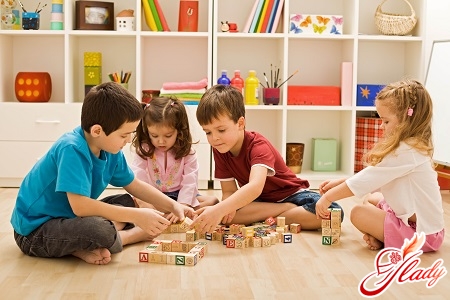
How to find an approach to your child?
Yes, it's hard to be a parent. Таким, чтобы и спокойный был, и уравновешенный, и справедливый, и добрый, и мудрый. Никто и не обещал легких путей, вам предстоит воспитать человека, и именно от мамы с папой зависит все. Прежде всего, запомните – родители являются эталоном для ребенка. Если мама сказала, что сын неумеха – значит, так и есть. Если дочка вдруг стала лентяйкой, то задумайтесь, не называли ли вы ее так? Дети, как губки, впитывают абсолютно всю информацию, и не думайте, что после вчерашнего наказания в голове у чада ничего не происходит. Совсем наоборот! Он думает, переживает, сомневается и принимает одно верное (как кажется ему) решение: как мама говорит, так и есть. Психологи часто советуют родителям разговаривать с малышом в ласкательной форме. Совсем необязательно 15-летнего подростка называть уменьшительно-ласковым прозвищем из детства, но вот в маленьком возрасте это очень полезно. Даже в этих словах малыш будет чувствовать добро, любовь и внимание. Сами посудите: Дмитрий – Димочка, Владислав – Владюша, Николай – Коленька. Вам же и самим приятно, когда близкие люди обращаются к вам уменьшительными именами. Никогда не ругайте своего ребенка в присутствии других людей и детей. Даже если это бабушки или дяди, соседи или племянники. Ни в коем случае нельзя унижать малыша! А поучения и наказания в присутствии посторонних – это самое настоящее унижение. Вы просто не представляете, сколько людей вспоминает этот свой детский «позор» всю жизнь. Именно с этого момента могут начаться проблемы с взаимопониманием. Еще один момент: если вы нашли у подростка дневник с личными записями, то никогда и ни при каких обстоятельствах не упоминайте об этом. Вы можете прочитать – там ведь будут сокровенные мысли вашего дитяти (мало ли, что там происходит в его жизни), но цитировать строчки, ругать его за что-то или рекламировать сие произведение перед отцом, бабушкой или подругой ни в коем случае нельзя. Чаще гуляйте со своим ребенком и играйте с ним в игры. Не стоит заменять общение компьютерными играми – это не самое лучшее увлечение. А вот поиграть в кубики, сделать аппликацию, смастерить какую-то поделку будет очень полезно! В конце концов, разукрасьте какую-то картинку – это очень нужно и вам, и малышу. Будьте добры к своему ребенку. Никакие неприятности и проблемы не должны отображаться на отношении к нему – помните, что как раз он совсем тут не причем. Свои обиды и злость выплескивайте на чем угодно, только не на нем. Лучше пройдитесь по улице, приведите свои мысли в порядок и успокойтесь. Или попросите ребенка выйти из комнаты на несколько минут, скажите, что у вас болит голова и хотите отдохнуть. Найдите любой вариант, но к общению со своим самым родным человеком приступайте только в хорошем расположении духа. Ничего страшного не будет, если вы извинитесь перед ребенком за свою ошибку. Ведь и взрослые могут поступать неверно. И если вы накричали незаслуженно, просто «сорвались», то не стыдитесь этого. Просто поговорите с ним и попытайтесь объяснить ситуацию. Обязательно попросите прощения – искренне, с обниманием и, возможно, даже слезами. Ребенок все поймет и простит, зато вы будете с ним близки. Он будет чувствовать, что не безразличен вам. А разве не это самое главное для наших детей? Советуем почитать:




